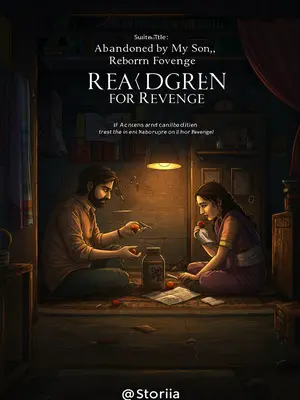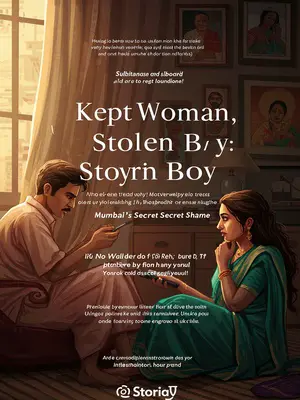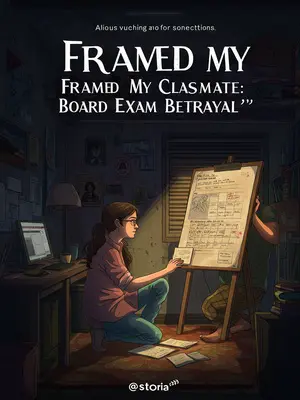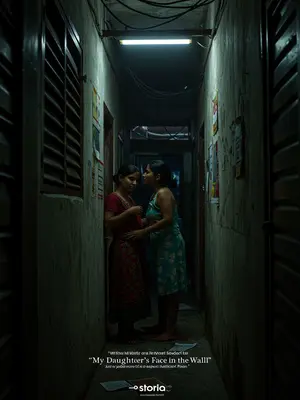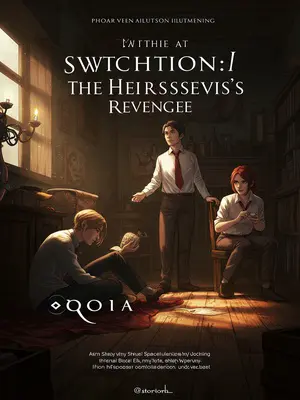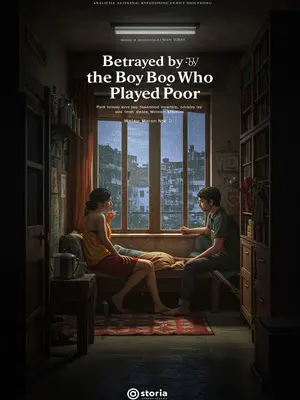Chapter 3: Secrets Unveiled
I wandered like a lost soul, muddle-headed every day, drawn to the world behind the wall. Harish Bhaiya and Meera appeared in my view like clockwork, as if they were a scheduled projection.
Life outside faded—my own work, my calls from home, even the aroma of the chaiwala downstairs. I became a ghost haunting my own flat, my thoughts always with the world on the other side. It was almost as if they were actors and I, the only audience, sitting with popcorn and a fluttering heart.
But gradually, I noticed something off about them. They barely communicated. Harish Bhaiya left early, came home late, working hard at his business, but somehow they never seemed to talk. No matter how late it was, Meera never refused him. What puzzled me most was, with Meera’s looks, even if she didn’t marry rich or famous, finding a decent man should have been easy. But Harish Bhaiya, all fat and greasy fumes, wasn’t even as good as me.
It made no sense. In India, where aunties assess every rishta on looks, salary, and family background, Meera could have had her pick. Why Harish Bhaiya? Was there some tragedy? Some family compulsion? Some debt? I couldn’t shake off the questions. Sometimes, as she sat quietly folding clothes or adjusting her bangles, I’d see a blankness in her eyes that felt heavier than the evening humidity.
A couple that looked loving but showed no real affection. I couldn’t help but wonder: how did greasy Harish Bhaiya marry such a beautiful wife? Could I do it too?
I’d think about my own failings—my broken dreams, my lack of money, my parents’ health—and the question would gnaw at me: If Harish Bhaiya could get someone like Meera, was it really impossible for me? The question lingered like the lingering smell of burnt dal in the corridor.
Until one day, I heard a soft door closing sound from across the hall. I was extremely sensitive to that sound—it usually happened at midnight, but now it was only 5 p.m.
The sound was soft, almost hesitant—the kind of sound you notice only when you’re looking for it. My heart started thumping as I quickly moved to the hole, holding my breath, ignoring the distant call of the doodhwala from the street.
Uneasy, I looked through the hole and immediately saw Meera in the arms of a man wearing a shirt and shorts. The man was not tall and very thin.
It felt like the air itself was holding its breath. The stranger’s hand was gentle on Meera’s back, their posture intimate yet nervous. It was the first time I’d seen Meera with anyone but Harish Bhaiya, and the sight sent a cold shiver down my spine. The man, with a thin, almost fragile frame, looked out of place in the cluttered, sunlit room.
“It’s a pity you quit. I spent a year looking for you,” the man said.
The words came out softly, in a voice that trembled with longing. He spoke in Hindi, but the lilt was different—maybe from Lucknow or Allahabad, hard to tell. He sounded like someone who’d spent months replaying old conversations in his head.
“Shaadi ho gayi hai, Kabir. Ab yeh sab chhod diya maine,” Meera replied.
Meera’s voice was soft, barely above a whisper, her words loaded with resignation. She smoothed her hair and looked away, as if bracing herself for the next storm. The way she said it—like a line practiced many times—reminded me of the way Indian women are taught to swallow their feelings and move on.
“Do you believe it? Since you quit, I haven’t looked for anyone else even once,” the man said as he started taking off his shirt.
His fingers fumbled at the buttons, desperation showing in the shake of his hands. The old fan in Meera’s room rattled, and for a moment, the world felt as fragile as his promise.
“I don’t believe you,” Meera pouted, giving him a playful punch. “Kaise bardasht kiya? Saans nahi ruki?”
Her words were playful, but her eyes darted to the door. She gave him a half-hearted nudge, and for a moment, her face lit up with mischief. The kind of teasing that, in another world, might have belonged to a college romance.
“I just want you.” The man gently pushed her, and Meera fell onto the bed.
It was quick, almost awkward—the way first loves stumble over themselves. Meera giggled, her hair spilling across the bedsheet, the laughter mingling with the sound of a street vendor outside selling roasted corn.
A dozen minutes later, the man took out a wad of cash—three 2,000-rupee notes—from his pocket, stuffed them under the pillow, and said, “I don’t want you to come back—I just think no one else is worthy of you.”
He tried to sound casual, as if handing over money was no big deal, but the way his hand shook betrayed his nerves. In India, the rustle of cash carries a thousand meanings. Under that pillow, those notes glowed with secrets.
Meera didn’t refuse. She gently helped the man get dressed, hugged him, kissed him, and saw him out.
There was a practiced tenderness in the way she tied the strings of his kurta, straightened his collar, and brushed imaginary dust from his shoulder. She hugged him tight, pressing her face into his chest for a moment longer than necessary. As he left, she lingered at the door, wiping a tear from her cheek with the edge of her dupatta.
Suddenly, I understood.
Like the last puzzle piece falling into place, it all made sense. The secret meetings, the silence between her and Harish Bhaiya, the expensive clothes she sometimes wore on her outings. It was as if the air in my room had turned heavy, pressing me down with a truth I didn’t want to admit.

